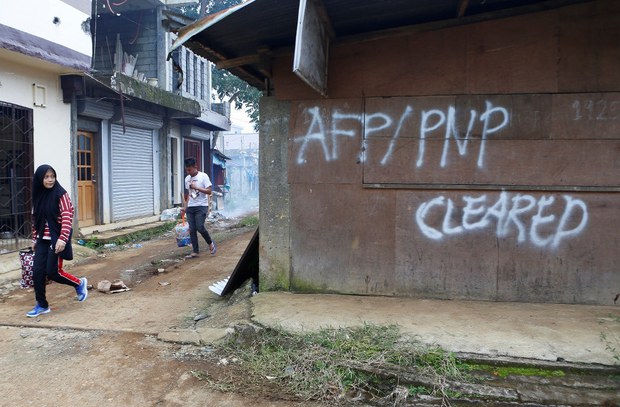Indonesian Militant Arrested in Marawi: Philippine Military
2017.11.01
Marawi, Philippines
 Residents trickle back to their homes in the southern Philippine city of Marawi, a week after officials announced the end of a battle with pro-Islamic State militants, Oct. 30, 2017.
Residents trickle back to their homes in the southern Philippine city of Marawi, a week after officials announced the end of a battle with pro-Islamic State militants, Oct. 30, 2017.
Updated at 11:56 a.m. ET on 2017-11-02
Philippine police arrested a suspected Indonesian militant on Wednesday as troops searched for enemy stragglers and bombs planted by pro-Islamic State (IS) fighters as they fled the ruined southern city of Marawi.
Village marshals caught Mohammad Ilham Syahputra, 23, early Wednesday near Loksadatu, a village in the same district in Marawi where the militants had made their last stand until last week, said Col. Romeo Brawner Jr., deputy commander of Joint Task Force Group Ranao.
“He was then turned over to the Marawi police. He is now being investigated by military and police investigators,” Brawner told reporters.
City police Chief Supt. Ebra Moxir said village officials found the man soaked with water. The suspect later told police that he swam to cross a lake.
“He was noticed by our village marshals because he was wet. He admitted that he was among the foreign fighters from the frontline,” Moxir told BenarNews.
Moxir said that an undetermined amount of cash was seized from the Indonesian, whom he described as in “poor health.”
An Indonesian intelligence source told BenarNews that Mohammad Ilham was a native of North Sumatra province.
In 2014, Mohammad Ilham was employed at an airport cargo company in Malaysia before he returned to Medan, the capital of North Sumatra, said the source, who also explained that the Indonesian joined the militants in the southern Philippines last November.
An Indonesian foreign ministry official told BenarNews that he could not immediately confirm the news of the arrest.
‘He is part of the initial siege’
John Guyguyon, police chief of the province of Lanao del Sur, where Marawi is located, told a news conference that Mohammad Ilham was carrying a bag with a mobile phone, a .45-caliber pistol, a fragmentation grenade, Philippine and Indonesian currencies and Saudi riyals.
“Our action is to file a case against him because he is part of the initial siege,” Guyguyon said. “We are preparing the investigation report so we can file cases of rebellion, terrorism and others.”
Guyguyon said the Indonesian had confessed that several gunmen were still hiding in the main battle area in downtown Marawi.
The Marawi battle began on May 23 when soldiers and police moved to arrest Isnilon Hapilon, the acknowledged leader of the Southeast Asian branch of IS who was on the FBI’s most-wanted list.
They were met by a huge force of Hapilon’s fighters, who were backed by militants from the local Maute group and fighters from the Middle East and Southeast Asia, including Malaysians and Indonesians.
Soldiers killed Hapilon and Omarkhayam Maute, one of the Maute group leaders, on Oct. 16.
Mahmud Ahmad, a Malaysian university professor who allegedly funneled money that financed the Marawi attack, was subsequently killed, the military also reported. It said Mahmud’s death was witnessed by several hostages who had escaped, but his remains have yet to be recovered.
President Rodrigo Duterte had admitted to underestimating the militant force and was compelled to accept aerial surveillance support from the United States and Australia, two of the country’s closest military allies.
Malaysia, Indonesia and Singapore also offered to stop the conflict from reaching their borders by participating in coordinated air and maritime patrols.
The militants ransacked banks, shops and homes in Marawi, a bastion of Islamic faith in the predominantly Roman Catholic country, and seized dozens of civilian hostages, many of whom were freed in the past several weeks as the military closed in on the fighters.
More than 200,000 residents fled their homes during the fighting, which transformed the once-beautiful city into a barren landscape of ruined buildings. Mosques and entire city blocks were reduced to rubble after Air Force jets engaged the militants in daily bombing runs.
Five months of fighting, which stoked fears that IS might gain a foothold in Southeast Asia, killed 942 militants, 165 soldiers and police, and 47 militants, according to the military.
About 6,400 have been cleared to return to their homes.
The Marawi gun battles may have been declared over, but analysts and officials have warned that other militant groups allied with IS in other fronts in Mindanao, the country’s restive south, would carry on with Hapilon’s cause.
The Indonesian’s arrest validated the local government’s position that “civil participation” is key to securing local communities from militant elements, Marawi spokesman Zia Alonto Adiong said in a statement.
“Crucial in our security effort to fully restore normalcy in the controlled area is to maintain vigilance by our residents,” Adiong said, adding that a localized civilian security plan was being drafted to complement the military’s clearing operations.
Felipe Villamor in Manila and BenarNews staff in Jakarta contributed to this report.
Updated to correct the spelling of the arrested Indonesian militant's name.







